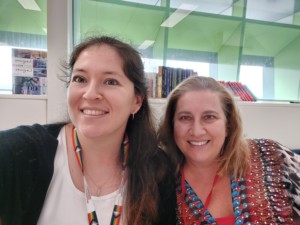Finding and developing meaningful connection with others is an essential part of our human journey. Community is important not only on a personal level but also influences our professional lives. However, the human element of educational research tends to get lost in negotiating the protocols of the academic institution. Two GIER doctoral students are breaking this mould, with their compelling auto-ethnography publication “Doctoral students’ collaborative practices in developing writer identities.”
 Carla Tapia and Nicola Stewart have drawn attention to the human elements of the PhD research journey in this recent publication, part of their thesis journey.
Carla Tapia and Nicola Stewart have drawn attention to the human elements of the PhD research journey in this recent publication, part of their thesis journey.
The paper discusses their individual challenges as women, teachers, carers and doctoral students in developing academic writing identities. They illustrate the importance of peer-led communities of practice in offering the necessary support and collaborative activities to enhance learning experiences.
Carla and Nicola explain that their combined interest in communities of practices arose in response to Dr Sue Whatman’s book chapter, detailing the establishment of online communities of practices for a sports coaching community.
Carla says:
“Thinking about Sue’s chapter helped us to identify how we unconsciously developed our own collaborative process. We needed additional types of support beyond those sometimes generic support mechanisms which the university can provide. COVID was part of the impetus to create new ways of connecting and collaborating with our peers. We could not access the university lifestyle we were used to, where we could talk to our peers, or see them on a daily basis. Something needed to be done, and our more unusual collaborative practices naturally arose to fill the gaps.”
Carla is an International student and Nicola is a mature student, returning to study after a long hiatus. These are arguably two of the most marginalised groups of university students.
By the time Nicola started her PhD, 30 years had elapsed since she was last in university based education, and she explains:
“A lot of technology and genre changes have occurred in this time. I would have given up if I didn’t have the support from Carla and other members of the HDR community of practice.”
In their article, Carla and Nicola speak to the multifaceted pressures placed on women in teaching and as carers, juggling multiple roles.
“As women in society we have faced what most women have; discrimination, sexual harassment and external expectations that we model societal norms of behaviour.”
Nicola says:
“There’s something about being taken for granted, especially as women, occupying caring roles and having these expectations alongside professional and intellectual responsibilities. We wanted to address this in our work – to acknowledge the realities of the student/parents busy composing theses in their cars at sports’ practice.”
The pair say that this project helped them to articulate the techniques and activities they used to create a community of practice and navigate the challenges of balancing multiple roles.
Carla says:
“Because this was an auto-ethnography we didn’t need to go through ethics approvals which facilitated the whole process. The paper helped us to identify and describe the steps we followed on a daily basis to navigate the doctoral journey.”
In their paper, Carla and Nicola note that traditional perspectives of writing and doctoral journeys omit discussion of the rollercoaster of emotions PhD students will invariably experience. Foregrounding the emotional and human element of the PhD journey is a refreshing and much needed change in academic publications.
About communities of practice, Carla says:
“There are complexities and nuances to a personal research experience where peer support is invaluable. When we collaborate with peers, everyone has different strengths and weaknesses, so drawing upon these different skill bases helps us to round out the variety of skills needed to complete a PhD.”
The pair are grateful for the support of their supervisors – Professors Parlo Singh and Beryl Exley and Drs Sue Whatman and Debbie Bargallie – in encouraging and supporting them to take on new opportunities and new challenges.
They say:
“At the top, universities sometimes think that all supervisors work in the same way. But this doesn’t always happen. We are really lucky to have supervisors who encourage us to take on new opportunities and new challenges. Everyone has been very encouraging and supportive of this work. Parlo, our shared supervisor, provided access and funding for us to get professional editing, and for this we are grateful.”
Read the full paper here Doctoral students’ collaborative practices in developing writer identities.


